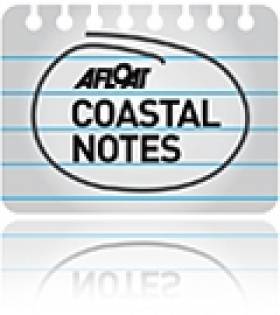Displaying items by tag: Message in a Bottle
New Jersey Family Connect With ‘Aoife’ in Ireland Who Threw Message in a Bottle Out to Sea
A family in New Jersey who found a message in a bottle from Ireland have connected with the woman who wrote it after the story went viral.
Frank Bolger says his wife and granddaughter found the bottle while litter picking on the beach in Wildwood, New Jersey on 17 August.
Speaking to RTÉ’s Morning Ireland last week, he relayed that the message was written by someone who identified themselves only as Aoife, with no contact information, and was dated 17 July 2019.
Part of the message reads: “Maybe it’s travelled down to Africa or to Iceland. I won't know if someone found this, but I hope it’s found.”
The Bolgers’ appeal to connect with the mysterious message writer moved a lot faster than the bottle did across the Atlantic Ocean, as Aoife Byrne discovered during the week.
The Bray woman connected with the Bolgers on social media and together they joined CBS News Philadelphia to share their remarkable story.
#MessageInABottle - Another connection's been made across the ocean between Ireland and North America thanks to a message in a bottle, as Canada's CTV News reports.
Last summer Canadian student Saskia Vaisey dropped a bottle into the freezing waters of the Arctic Ocean, with a note sealed inside describing the wildlife and sights she saw while on an Arctic study programme.
That very bottle was discovered earlier this month on a beach near Claddaghduff in Co Galway by German national Eva Hart, who emailed Vaisey shortly after to express her excitement at the find.
It was an important one for Vaisey from a marine science standpoint, too, as she send her message-in-a-bottle along with 50 of her fellow students as a part of a 'Drift Bottle Project' to track ocean currents.
And it's not the first time that Canada and Ireland have been linked by such a long-distance message, as two years ago a young boy in Co Waterford discovered a note sent into the sea by two French-Canadian girls some eight years before.
‘Afloat’ Project Launches Vessels with Messages of Positivity
#AfloatProject – As previously reported, the 'Afloat' project of Dalkey-based visual artist, Roisin Cunningham, took place on Sunday where 50 bottle jars containing messages about the recession made contact in the waters of Dublin Bay, writes Jehan Ashmore.
Since then the first jar (No.22) has been found washed ashore this morning by a woman while walking on the beach at Sutton. The jar had drifted from the location of the bottle launch in the seas off The Muglins near Dalkey Island in the south of the bay. For a photo, click the link to Roisin's 'Afloat' facebook page.
The inspiration for the Afloat project had originated several years ago and is based on the main theme of communication between people and how this can be achieved. What appealed to the artist is the idea of using ordinary people's messages, often because their ideas have no platform.
As the ideas gathered, she was surprised and encouraged at how when asked to send a personal message to a stranger, people engaged in such a positive way with inspirational quotes or greetings.
The messages in the jars not only reflected the state of the nation in which in recent years we seemed to have, as an Island people, had many ideas and criteria forced on us. This is where Roisin wanted to gauge what was the general mood among the people.
In addition the jars contained a paper boat and a numbered piece taken from a painting of the Muglins painted by the artist.
The rocky outcrop of The Muglins and its lighthouse is where strong currents converge and which can make for notoriously unpredictable conditions.
Despite the swells at high-tide and under an overcast sky, Roisin was rowed out from Coliemore Harbour by the Dalkey Rowing Club's Ladies junior team, crewed by Nadine Cunningham, Sinead McCullogh, Claire Cunningham and Mary-Grace Power. They clearly displayed their rowing skills coupled by the cox of the day Pat Dalton.
So where have the natural elements taken the other jars as they bob and drift about the Irish Sea and who knows to where else?...
Message in a Bottle Lands in Waterford After Eight Years At Sea
#MESSAGE IN A BOTTLE - It took eight years to cross the Atlantic, but a message in a bottle sent by two girls from eastern Canada finally found a recipient - in Co Waterford.
As the Irish Independent reports, 10-year-old Oisin Millea found the letter encased in a 2-litre soft drink bottle more than a week ago among litter from the sea strewn across the beach at Passage East.
And thanks to the wonders of the internet, he was able to contact the girls who sent the message - and even see them on his computer screen via Skype.
RTÉ News says it got in touch with the two French-Canadians, who were aged 12 when they sent the bottle into the sea via the St Lawrence River in Quebec back in the summer of 2004.
Charlene Dalpé and Claudia Garneau, now 20 years old, told the Irish Independent that they have remained friends since, and described Oisin's discovery as "really exciting".
































































